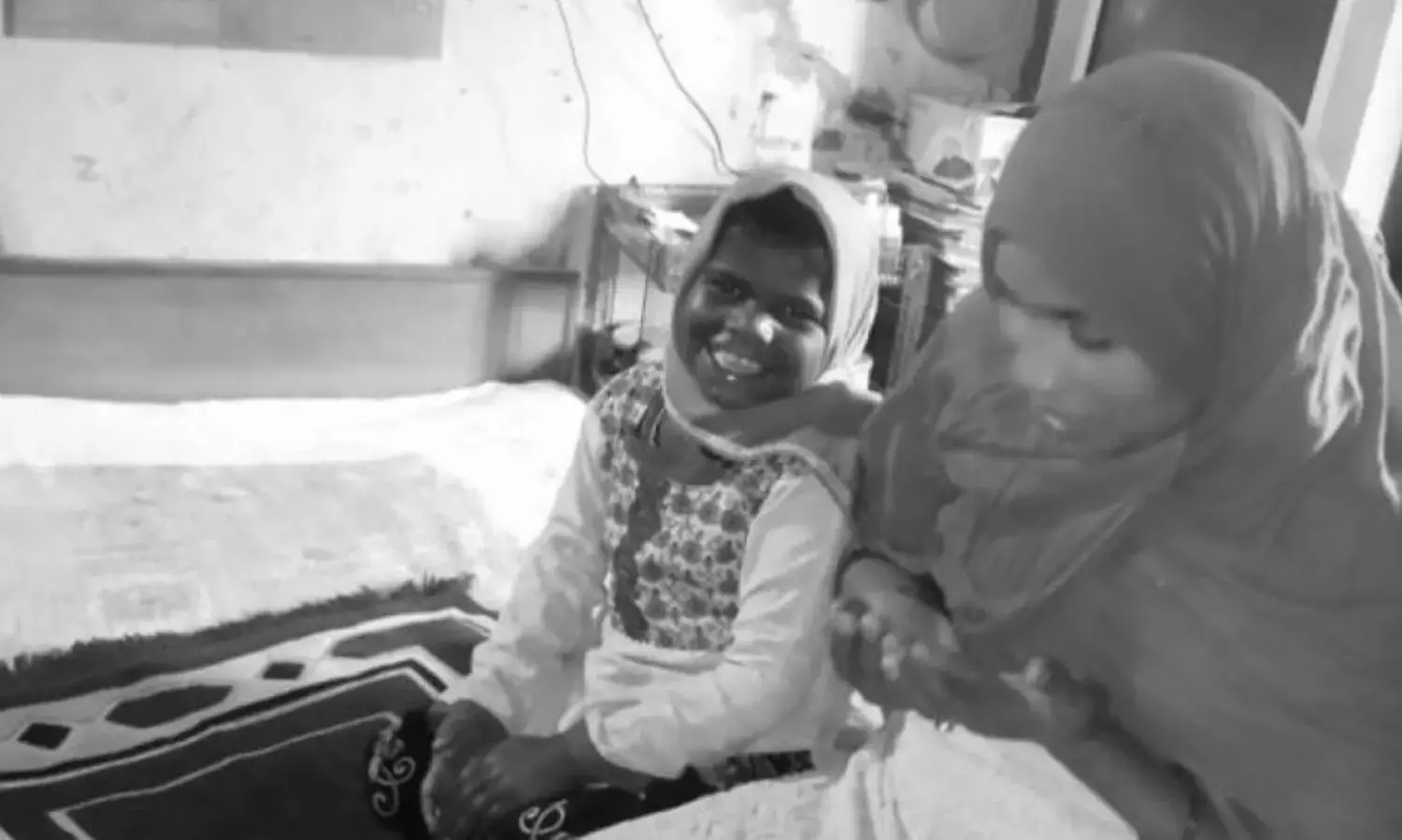Baaliya ki Amma
Baaliya’s mother
Most of Reshma’s stories are about her youngest daughter Baaliya. She has three children, but loves to be called Baaliya ki amma by everyone she knows.
Not Zubair ki amma or Ruby ki amma, but Baaliya’s mother.
Baaliya and her parents have been to every big hospital in Lucknow. King George’s Medical University, Lohiya Hospital, SGPGI, Vivekanand Polyclinic… they all said 11-year-old Baaliya would never walk, that it was too late for them to intervene.
The doctors agree she has a thyroid disorder and abnormality that affects her motor and neurological functioning. She could only stand up with support, and sitting for long periods she developed a slight hunch, and gained more weight than was healthy for her. Reshma successfully worked on Baaliya’s diet to reduce her weight so it won’t hinder her movements.
Her own strong personality makes a lasting impression. Reshma is usually perceived as hotheaded, the angry young woman archetype, but she’s actually really tender, especially when it comes to Baaliya.
“She sits at the gate, no matter where I am coming back from. When I come back from buying groceries, she’s sitting at the gate. When I come back from work she’s sitting at the gate. And oh God! She keeps asking everyone in the community for money, and uses it to buy samosas,” says Reshma, exasperated but laughing.
“She sits like a granny, a nani amma.”
The story of Baaliya’s name. It finds no place in the dictionaries but is full of meaning.
“When she was born we named her Khushbu, but called her Aaliya at home. My brother calls her Tanu. Everyone in the community started calling her Baaliya, so that’s her name now even in medical reports. It doesn’t mean anything, it’s just out of love. People love her, so they call her by any name and she will respond.”
Reshma often finds herself conflicted about her feelings. She is worried about how the parents will take care of their daughter when they are old themselves and need care. But she doesn’t let it bog her down, even finds mirth in it.
“She loves being neat and tidy, loves it when I get her ready after a bath, and loves new clothes. But I keep washing them or throwing them away because they get soiled. If I’m busy and don’t give her a bath, she gets very cranky and angry. She loves being ready all the time.”
Like most mothers, Reshma worries how to deal with three growing kids. She feels it will be more of a challenge with Baliya and Zubair than with Ruby.
She tries to keep up a strict front for Zubair, who is naughty and gets into trouble “because of the company he keeps”, but she can’t be consistent with it because Baliya needs care and warmth.
“She’s really irritated by diapers. She tears them and throws them off with all her energy. It gets difficult. And sometimes, she feels hot or irritated and starts tearing her top, exposing her upper body. It really makes me angry. I can’t make her understand she is growing up and people look.”
“Woh phatt se yeh karti hai aur hum bilbila jaate hain. Usko pata nahi yeh kya zarurat mehsoos hoti hai!” (She just does it in a flash and I get nettled. I don’t know why she feels the need!)
“I’m worried what will happen when puberty begins, or how to explain menstruation to her. She’s going on 12 now, I don’t know what will happen later.”
“But she’s at least learnt that she isn’t supposed to eat or drink anything before having her thyroid medicine in the morning, so that’s good.”
Reshma says she couldn’t have done it all herself. She has had help. “Zubair takes good care of her, but I’ve asked him not to take her to the washroom or give her a bath any more. He loses his patience when she starts ripping her clothes off. It’s better if we parents do it, we are better equipped and more patient. Zubair is a kid himself.”
“Baaliya is close to her Papa too. She complains to him, exaggerates, tells him about everyone at home.”
“I tease my husband saying, take her with you in the tempo and drive her around with the passengers. Maybe they will pay you more after seeing her.”
I look at her shocked, and she laughs. We laugh.
“It’s good that everyone in our community is so nice. They take care of her. It doesn’t matter if it’s Ibu who is otherwise drunk. He takes care of her when he’s in his right mind. He helped her walk.”
“Even people from the karkhana look after her. Often they give her food, makes sure she drinks water. Sometimes she gets it herself from the fridge.”
“Sometimes she takes all her clothes and puts them in the bucket with a bar of soap, as if she has washed them. Then she’ll take some of the wet clothes out, fold them and keep them in the cupboard. She also arranges her shoes there. She also picks up trash from the bin and arranges it there. It’s a mess and infuriating but it is funny.”
“When she walked those few steps, I can’t tell you how I felt. I just can’t tell you… I felt like doing something, I didn’t know what. Jism mein thandak pad gayi thi (I felt chills). She walked just a little bit, but it felt so good, she had been sitting all this while.
“I used to keep saying Uth jao Baaliya, uth jao, and she finally did.”





